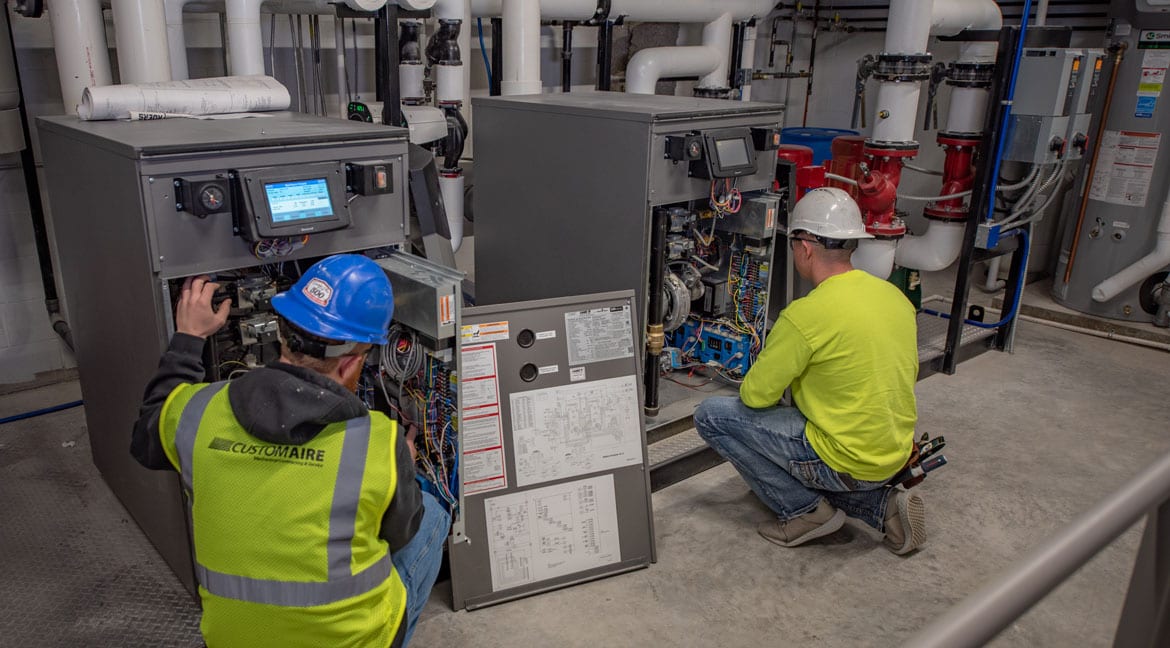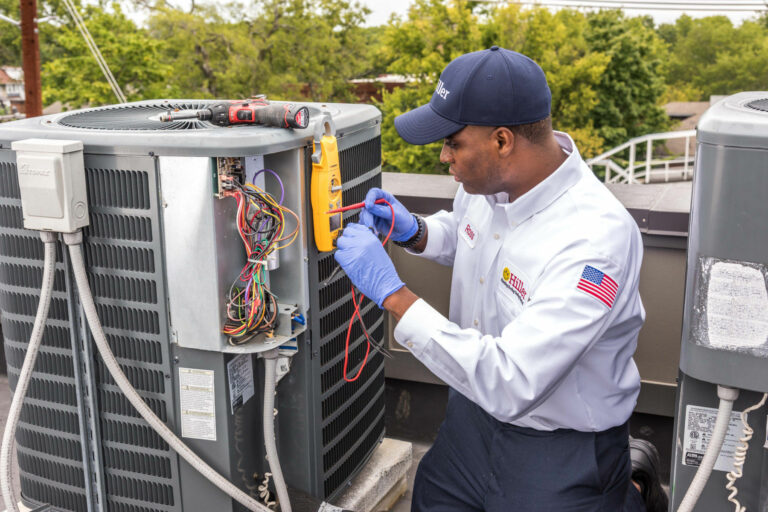Essential Insights About ductless mini splits Before You Upgrade
Essential Insights About ductless mini splits Before You Upgrade
Blog Article
Picking Between a Heatpump and Furnace: Trick Factors To Consider for Your HVAC Demands
When reviewing home heating options for cooling and heating requires, the decision in between a warm pump and a furnace can be complex. Each system supplies unique advantages customized to certain climates and power effectiveness goals. Recognizing these differences is important for making an enlightened option. Key variables such as setup prices and ecological effect even more make complex the choice procedure. Which choice truly straightens with one's comfort and sustainability preferences? The complying with areas will certainly discover these considerations thoroughly.
Understanding Heat Pumps: Exactly How They Work and Their Benefits
While several house owners take into consideration numerous heating choices, understanding exactly how warmth pumps function and their benefits can greatly affect their decision. Heatpump operate by moving heat rather than creating it. In the winter season, they remove heat from the outside air or ground and move it indoors, while in the summertime, they reverse this procedure, cooling down the home by removing warmth outside. This twin functionality makes them flexible for year-round environment control.One of the key benefits of warm pumps is their power performance. They use significantly much less power contrasted to standard furnace, potentially resulting in lower energy expenses (heat pump replacement ooltewah tn). Additionally, heat pumps have a smaller carbon footprint, making them an environmentally friendly option. They likewise call for less maintenance than conventional systems, adding to long-lasting cost savings. Generally, comprehending the auto mechanics and advantages of heatpump can aid property owners make notified decisions concerning their heating and cooling requirements
Checking Out Heating Systems: Types, Operation, and Advantages
Furnaces can be found in numerous kinds, including gas, electrical, and oil designs, each with unique operational mechanisms. Understanding these distinctions is essential, as they influence performance and home heating performance. In addition, heating systems supply many benefits, such as consistent warmth outcome and dependability in colder environments.
Types of Furnaces
Heating unit can vary considerably in layout and procedure, with furnaces being a preferred option among home owners. There are a number of kinds of heaters, each using different fuel resources and technologies. Gas heating systems prevail, leveraging gas to create heat effectively. Electric furnaces, on the various other hand, utilize electrical resistance to generate heat, typically favored for their simple installation. Oil heating systems, while less typical, work in areas with limited gas gain access to (heat pump installation ooltewah tn). Furthermore, condensing heaters make best use of energy effectiveness by recycling and capturing exhaust gases. Each kind runs through a system of heat exchangers and ductwork to distribute cozy air throughout a home. Recognizing the distinctions in between these heater types is necessary for informed heating and cooling choices
Advantages of Furnaces
For property owners looking for reliable warmth during cool months, the benefits of furnaces are considerable. Heating systems provide regular heating, making sure also temperatures throughout the home. They are especially reliable in severe cool, frequently outmatching heatpump in freezing conditions. Different kinds, including gas, electric, and oil furnaces, provide versatility to satisfy varied requirements and preferences.Furnaces additionally often tend to have reduced first installment prices contrasted to heatpump, making them an extra accessible option for lots of. Their robust layout adds to a longer life-span, with several devices lasting over 15 years with correct upkeep. In addition, contemporary heating systems are commonly furnished with advanced innovation for enhanced effectiveness, which can result in decreased energy costs. On the whole, heaters continue to be a reliable option for reliable home heating.

Energy Effectiveness: Contrasting Heat Pumps and Furnaces
When contrasting power efficiency between warm pumps and heaters, the Seasonal Energy Effectiveness Proportion (SEER) plays an essential function in figuring out efficiency. In addition, an operational cost analysis exposes the lasting economic implications of each system. Comprehending these aspects can lead homeowners in making notified decisions concerning their home heating remedies.
Seasonal Energy Efficiency Proportion
Energy effectiveness plays a necessary duty in the decision-making procedure in between warmth pumps and heaters, specifically when considering the Seasonal Power Performance Proportion (SEER) This statistics measures the cooling efficiency of warmth pumps over a whole air conditioning period, offering a standard means to assess efficiency. Greater SEER scores suggest greater energy efficiency, translating to reduced energy consumption and decreased utility costs. In comparison, heaters are typically assessed making use of the Yearly Fuel Usage Efficiency (AFUE) rating, which mirrors home heating effectiveness. When comparing these 2 systems, home owners must prioritize SEER ratings for heatpump, as they directly effect total energy cost savings and ecological sustainability. A comprehensive understanding of SEER can especially affect the long-term satisfaction and cost-effectiveness of the picked a/c service.
Functional Expense Analysis
Recognizing sites the functional costs related to heatpump and furnaces is essential for house owners evaluating their alternatives. Heatpump generally provide higher energy effectiveness, converting electrical energy right into heat with very little waste. This results in reduced monthly recommended you read utility costs, especially in modest climates. On the other hand, traditional heaters, particularly gas designs, may have lower ahead of time costs however can sustain greater operational costs with time because of sustain prices and performance ratings.Moreover, warmth pumps can work as both home heating and cooling down systems, potentially reducing the need for different heating and cooling devices. While initial investments for warmth pumps might be higher, their long-lasting savings in energy effectiveness can make them a much more cost-effective choice for lots of houses. Careful analysis of regional energy prices is important to determine the very best alternative.
Installment Expenses: What to Anticipate for each and every Heater
Installation costs for heating unit can vary substantially in between warmth pumps and heaters, affecting homeowners' decisions. Heatpump typically have higher upfront setup costs, usually ranging from $3,500 to $8,000, depending upon the system size and complexity of installation. This consists of the exterior device, interior handling system, and essential ductwork adjustments. Alternatively, heating systems tend to have lower preliminary prices, averaging in between $2,500 and $6,000, which can be appealing for budget-conscious home owners. Setup expenses can boost if considerable ductwork is required.Moreover, the selection of fuel type for heaters-- all-natural gas, propane, or electrical-- can likewise impact installment expenses. While heat pumps supply power efficiency, their first investment may hinder some purchasers. Ultimately, evaluating setup expenses alongside lasting savings and performance will aid house owners in making informed choices concerning their furnace.
Environment Considerations: Which System Does Much Better in Your Location
Just how do environment conditions affect the effectiveness of heater? The performance of warm pumps and heaters can vary substantially depending upon the local climate. In modest climates, heatpump succeed by effectively moving warmth from the outside air, making them an energy-saving choice. Their efficiency reduces in extremely cold temperatures, where they might battle to extract sufficient warm. Alternatively, furnaces, particularly gas designs, supply reliable and constant warmth no matter outdoor conditions, making them more suitable in chillier regions.In areas that experience milder winter seasons, heatpump can run effectively year-round, giving both cooling and heating. In contrast, areas with rough winters months often benefit from the robustness of furnaces. Ultimately, understanding the local climate is essential when choosing between a heatpump and a heater, as it straight impacts their operational efficiency and overall efficiency.
Maintenance Needs: Long-Term Treatment for Warm Pumps vs. Furnaces
While both heatpump and heaters need regular upkeep to guarantee peak efficiency, their particular needs and treatment routines differ considerably. Heating systems typically need less regular interest, with annual inspections being enough to look for gas leakages, clean filters, and examine overall capability. Their easier layout typically allows for uncomplicated repairs.In comparison, heatpump demand biannual maintenance due to their dual duty in cooling and heating. This includes cleansing coils, examining refrigerant degrees, and ensuring that both the outdoor and indoor systems operate at their best. Furthermore, warmth pump maintenance usually includes even more detailed parts, making expert maintenance essential.Neglecting upkeep can lead to reduced performance and enhanced energy expenses for both systems. Inevitably, homeowners must take into consideration these long-term care requirements when selecting in between a heatpump and a heater, as aggressive maintenance can extend the life expectancy and performance of either system significantly.
Ecological Influence: Picking a Lasting Home Heating Alternative
The ecological influence of heating unit is a vital check out here evaluation for home owners seeking lasting choices. Heatpump are typically extra energy-efficient than conventional heaters, as they move warm instead than produce it, considerably minimizing carbon discharges. By using sustainable power resources, such as air-source or geothermal heatpump, house owners can additionally minimize their environmental footprint.On the other hand, gas furnaces emit greenhouse gases and contribute to air contamination, though they usually supply higher heat result. Developments in technology have actually led to the advancement of high-efficiency furnaces that lessen emissions.Ultimately, choosing a home heating system includes weighing performance against ecological effect. Homeowners are urged to review regional energy sources and rewards for sustainable systems, making sure an option that lines up with both personal convenience and environmental obligation. The choice affects not just immediate convenience but also long-lasting sustainability and ecological wellness.
Often Asked Questions
For How Long Do Warm Pumps and Furnaces Typically Last?
The life expectancy of heatpump usually varies from 15 to twenty years, while heaters can last in between 15 to thirty years. Normal maintenance significantly influences their longevity and effectiveness in giving heating options.
Can I Make Use Of a Heatpump in Incredibly Cold Climates?
Heatpump can operate in incredibly cool environments, but their efficiency reduces as temperatures decline. In such conditions, supplemental home heating sources might be essential to preserve comfortable interior temperatures and ensure peak performance.

What Is the Sound Level of Heat Pumps Versus Furnaces?
The sound levels of warmth pumps and heating systems vary substantially. Normally, heat pumps operate even more quietly than typical heating systems, making them preferable for those conscious sound, while heaters may generate louder operational noises throughout home heating cycles.
Are Warm Pumps Suitable for Both Heating & Cooling?
Warm pumps are indeed ideal for both heating and cooling (furnace replacement). They function by moving warmth, supplying efficient temperature control year-round, making them a functional choice for home owners seeking an all-in-one a/c solution
What Size Heating Unit Do I Required for My Home?
Identifying the proper dimension heater for a home needs reviewing elements such as square video footage, insulation top quality, local climate, and the home's design. Consulting a specialist can ensure an accurate evaluation and perfect convenience. Warm pumps generally supply higher power effectiveness, converting electrical power right into warmth with marginal waste. In moderate environments, warmth pumps succeed by efficiently transferring warm from the outdoors air, making them an energy-saving choice. Alternatively, furnaces, particularly gas models, offer constant and trusted warmth no matter of outdoor problems, making them preferable in colder regions.In locations that experience milder winters, heat pumps can run effectively year-round, providing both heating and cooling. Warmth pumps are generally more energy-efficient than traditional furnaces, as they move warm rather than generate it, greatly reducing carbon emissions. By making use of eco-friendly energy sources, such as air-source or geothermal warm pumps, property owners can even more lessen their ecological footprint.On the various other hand, natural gas furnaces produce greenhouse gases and add to air pollution, though they frequently provide greater warm output.
Report this page